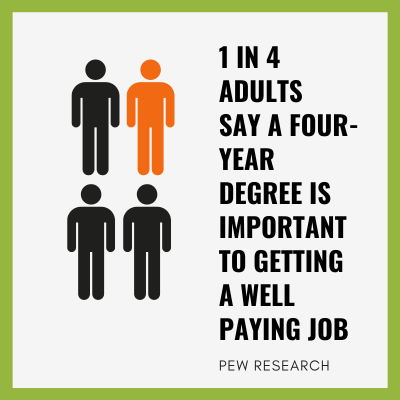One of the things that excite Jobspeaker the most is equity in education. The current #workforcedevelopment movement not only recognizes the need for all levels of skill development but celebrates it. Students no longer believe that a four-year degree is the only path to a successful and meaningful career. Although we would certainly never discourage anyone from earning a degree, ours have served us well; we do advocate for earning the skills needed for a career you love.
With this in mind, we were very encouraged when we read The Appalachian Regional Commission’s strategic plan. For your reading enjoyment, we’ve included the second related to Building Appalachia’s Workforce Ecosystem.
Investing in Appalachia’s economic future.
Objective 2.1: Develop and support educational programs and institutions from early childhood through post-secondary that provide the building blocks for skills development and long-term employment success. While progress has been made in some pockets of the Region, there is a great need for more and higher-quality education opportunities from preschool through K–12 and post-secondary and adult education. A focus on work readiness, technical skills, and traditional and digital literacy skills is critical to helping Appalachians, particularly those in underserved communities, successfully navigate and access education and employment opportunities.
Objective 2.2: Invest in workforce development programs and strategies informed by industry talent needs and designed to allow workers to simultaneously earn, learn, and advance along a career pathway. A critical component of the workforce ecosystem involves convening education, workforce, economic development, and industry representatives to ensure that training is designed to meet industry needs and leads to employment. Career pathway systems, defined by community and technical colleges, workforce development, and other partners, are essential tools that map out paths for
individuals to enter and advance in careers. Career pathway systems include short-term vocational training that leads to credentials, dual high school/college enrollment, credit for prior learning, stackable credentials, work-based learning (on-the-job training, apprenticeships, internships, etc.), and career awareness education for youth to learn about high-growth
industries and occupations. Career pathway systems can also incorporate a focus on soft skill development, both in curriculum and work-based learning experiences.
Objective 2.3: Develop a network of employment supports to help Appalachians enter and remain in the workforce. In many communities across Appalachia, even if job opportunities are available to residents, a lack of transportation, childcare, eldercare, affordable housing, food, and other key factors can make those jobs inaccessible or unsustainable. An additional critical barrier for a disproportionate number of Appalachians is substance use disorder and opioid misuse, which further undermines the ability of those impacted to access employment and education opportunities; take care of
their physical, mental, and financial well-being; and contribute to overall economic growth. Investment in a cohesive system of key services that support access to and retention of employment is vital to economic prosperity in the Region and the economic vitality of residents. Building Appalachia’s Workforce Ecosystem Appalachia Envisioned – Page 21
Objective 2.4: Expand access to high-quality healthcare as well as programs and services that support overall mental and physical health, for workers and their families. Many parts of the Appalachian Region do not have an adequate supply of medical professionals and facilities to meet residents’ physical and mental health needs, and telehealth is also not an option for those communities lacking reliable broadband service. Appalachians who face chronic health conditions need access to comprehensive and affordable healthcare as well as investments in innovative public health practices to ensure they are ready for work.
Click to read the full plan.
Or if you are ready to learn more about Jobspeaker, schedule a demo today.


